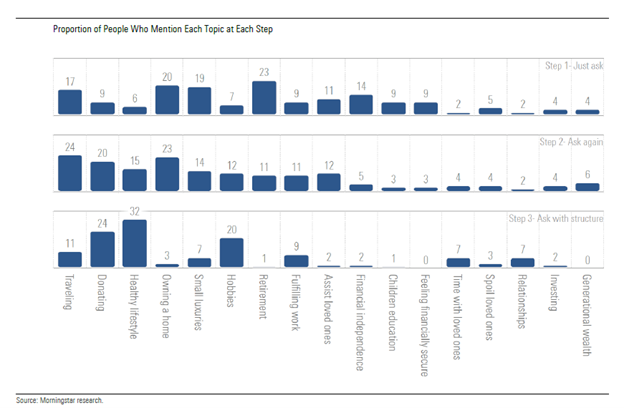
At Morningstar we are proponents of goals-based investing. This approach means putting yourself and your goals at the core of your investment strategy and process.
This contrasts with the "wealth maximisation" approach. The notion of wealth maximisation is investing to have the most money possible. Many investors either subconsciously or outwardly have this goal. The issue is that this strategy mostly leads to poorer outcomes. It is not the concept that is the problem. It is the behaviour it encourages.
A logical extension of trying to have the most money possible is to chase returns. An investor trying to have the most money possible will constantly be searching for where the highest returns are and then moving money to that sector, asset class, product – whatever it is at the time. For example, in the recent past that would mean a portfolio filled with crypto, SPACs and thematic ETFs. This is not a sustainable investing strategy.
We have written, presented and spoken (see below) extensively about defining goals. It is the first step in our four-step portfolio construction process:
1. Defining goals
2. Working out your required rate of return
3. Asset allocation
4. Selecting Investments
Constructing your portfolio in this way means you have a structure and framework behind your investments. It discourages poor investor behaviour and gives you a north star that you’re able to use to understand whether you are on track to acheiveyour goals.
It also allows you to tie investments to your goals, and ultimately provide justification for whether you decide to buy, hold or sell. This is why goals are important. It means that you have structure around your decision-making process, and makes it less likely you will chase performance.
Where's Your Proof?
Morningstar has conducted new research that revisits the framework for the goal setting process. Although the research focuses on how financial advisers can help their clients during the goal-setting process, there are lessons for self-directed investors as well.
The purpose of the research is to understand the best way to uncover financial goals. Understanding your financial goals is paramount to being able to properly plan and invest for them. Due to cognitive biases, people can be strangers to themselves and what you think may be a financial goal might not actually reflect your true motivation.
Why You Should Dig Deeper For Goals
When our investor respondents were asked outright to name their financial goals they tended to list common financial goals. For example, retirement or buying a house.
These are called "surface goals". When investors were put through a framework to dig deeper for their goals – they ended up changing. The changes reflected their values like donating to causes that they believe in and maintaining relationships with family and friends. These are called "deeper goals".
For example, a person’s original surface goal could be to buy a vacation home in Whitby. Upon further review, this person's deeper goal may be to spend dedicated quality time with their family twice a year, which they hope to achieve via the vacation home. However, this same deeper goal can also be achieved by buying a much more "affordable" house outside Darlington.
The results showed treating your goal setting as a multi-step endeavour can help you understand what you’re trying to achieve, and what is going to make you happy.
How to Dig Deeper
Step 1: List your top three financial goals.
We suggest doing this privately, so you don’t feel anchored to what first comes to mind or embarrassed if you decide to change your mind later. List the following:
• Most important goal;
• Second most important goal;
• Third most important goal.
Step 2: Take a look at this master list of common financial goals.
Are any of the goals on the list important to you? Write down the ones that are.
• To be better off than my peers;
• To pay for personal self-improvement (e.g. go back to school, learn a skill);
• To experience the excitement of investing;
• To start a new business;
• To buy a house;
• To help pay for my kids' education;
• To stop working and do something I love;
• To go on a dream vacation;
• To relocate in retirement;
• To care for my aging parents;
• To give to charity or other causes I care about;
• To feel secure about my finances in retirement;
• To feel secure about my finances now;
• To leave an inheritance to my loved ones;
• To retire early;
• To pay for future medical expenses;
• To not be a financial burden to my family as I grow older;
• To manage my debt.
Step 3: Look at your initial list and master list. Consider the goals you wrote down and the goals you checked. Of these goals, what are the top three? Write them down in order of importance.
Step 4 (optional): Revisit the master list of common financial goals and cross out the goals that are least important to you. Sometimes identifying what you don’t care for can help clarify what really drives you.
The Results!
In the study, 75% of people change at least one of their top three financial goals after going through this process. The findings of the study suggest that investors benefit from a structured process when they’re defining their goals.

As an investor, truly understanding your goals increases the likelihood that you will stick to your plan. It can also help with helping you achieve what you are trying to achieve sooner, or with less risk in your portfolio – like in the example of the holiday home.





























